MGBBT0FYP Research Project: Inflation and Tourism Solutions
VerifiedAdded on 2023/06/05
|10
|2111
|160
Project
AI Summary
This research project investigates the impacts of inflation on the tourism industry, focusing on both positive and negative effects. The study examines how inflation, caused by factors like increased production costs and shifts in demand, influences the tourism sector's performance. It explores the effects of rising prices on consumer behavior, such as booking cancellations and reduced spending, and analyzes quantitative and qualitative data to support its findings. The project highlights the importance of understanding inflation's dynamics and proposes solutions for the tourism industry to mitigate its adverse effects, including productivity enhancements, financial planning, and price model adjustments. The conclusion emphasizes the need for proactive strategies to navigate economic uncertainties and maintain the industry's sustainability.
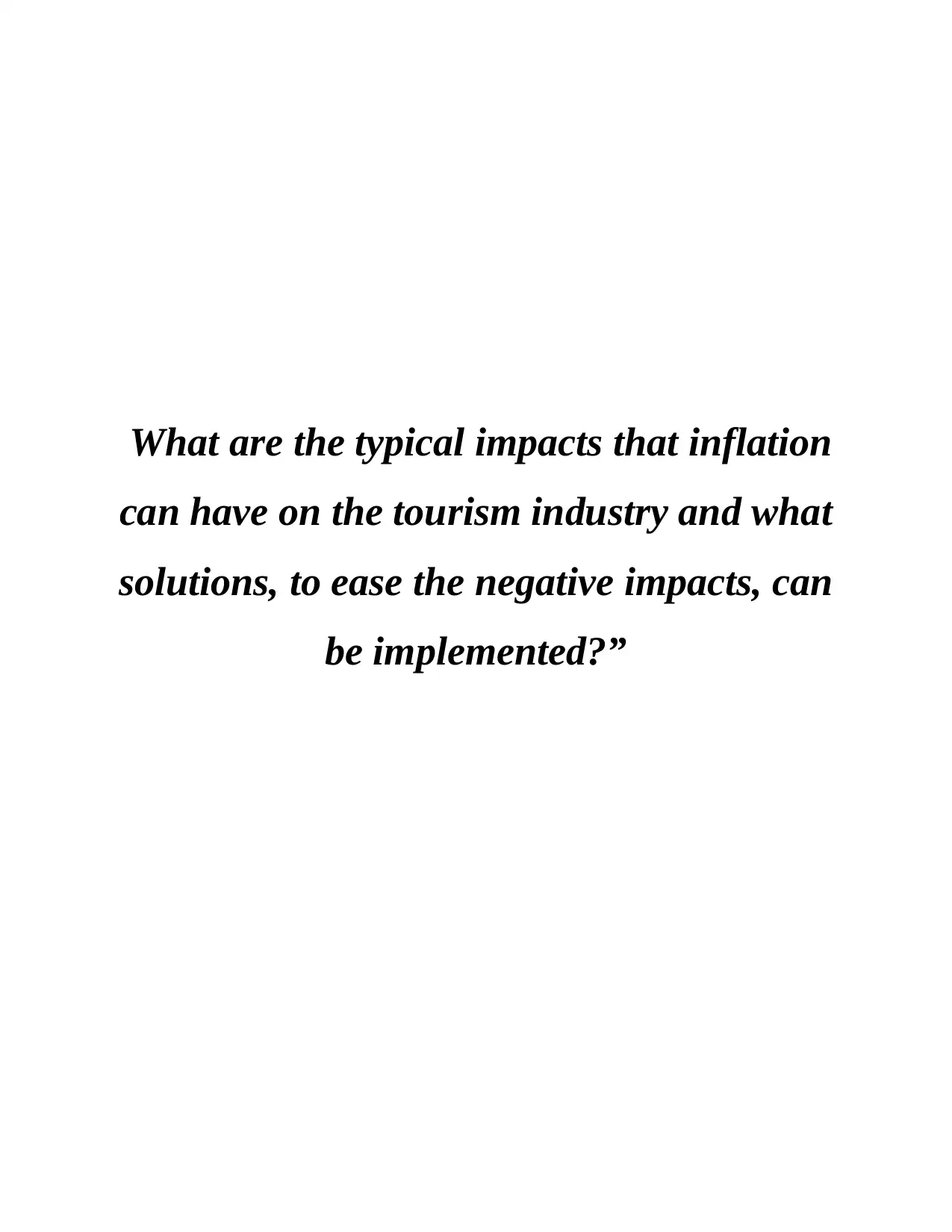
What are the typical impacts that inflation
can have on the tourism industry and what
solutions, to ease the negative impacts, can
be implemented?”
can have on the tourism industry and what
solutions, to ease the negative impacts, can
be implemented?”
Paraphrase This Document
Need a fresh take? Get an instant paraphrase of this document with our AI Paraphraser
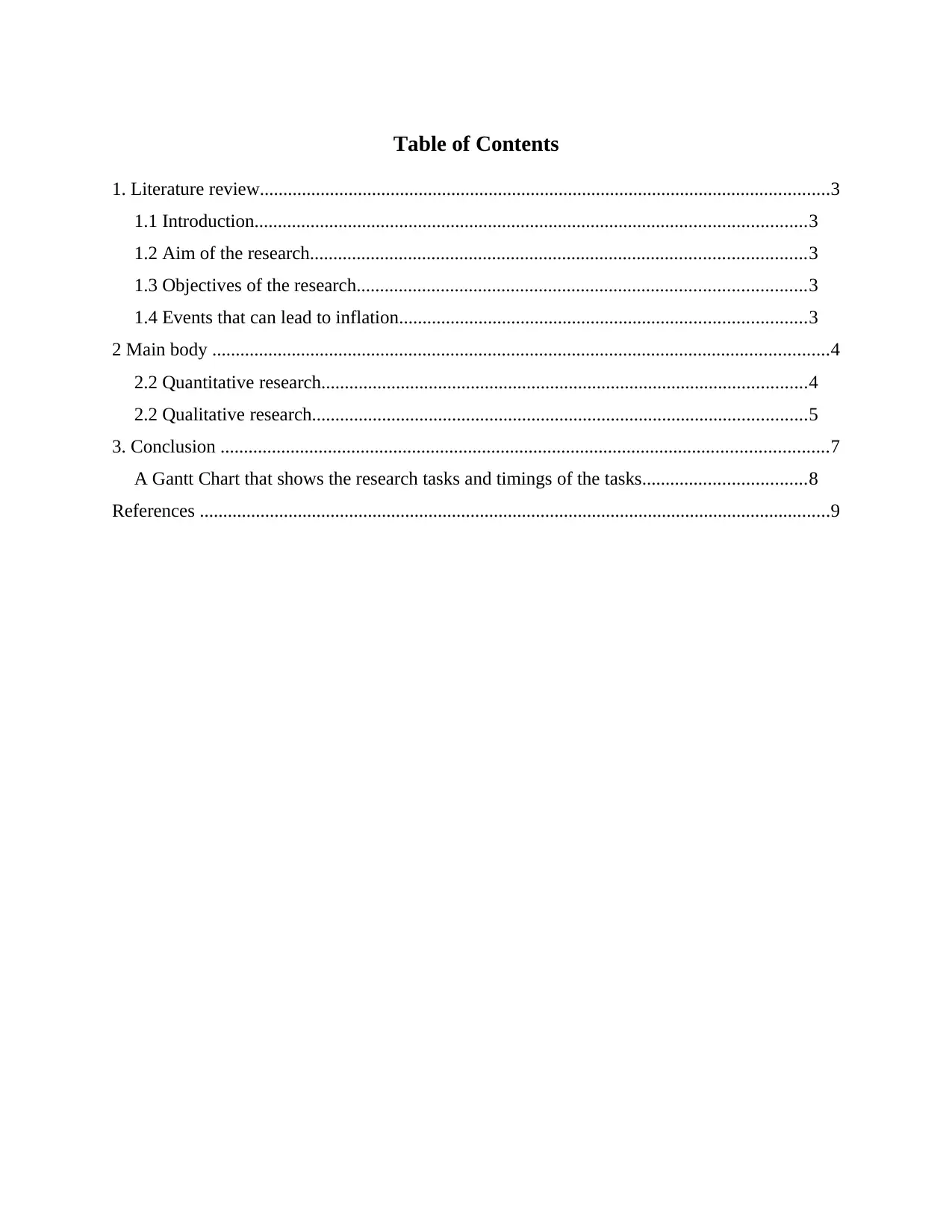
Table of Contents
1. Literature review..........................................................................................................................3
1.1 Introduction......................................................................................................................3
1.2 Aim of the research..........................................................................................................3
1.3 Objectives of the research................................................................................................3
1.4 Events that can lead to inflation.......................................................................................3
2 Main body ....................................................................................................................................4
2.2 Quantitative research........................................................................................................4
2.2 Qualitative research..........................................................................................................5
3. Conclusion ..................................................................................................................................7
A Gantt Chart that shows the research tasks and timings of the tasks...................................8
References .......................................................................................................................................9
1. Literature review..........................................................................................................................3
1.1 Introduction......................................................................................................................3
1.2 Aim of the research..........................................................................................................3
1.3 Objectives of the research................................................................................................3
1.4 Events that can lead to inflation.......................................................................................3
2 Main body ....................................................................................................................................4
2.2 Quantitative research........................................................................................................4
2.2 Qualitative research..........................................................................................................5
3. Conclusion ..................................................................................................................................7
A Gantt Chart that shows the research tasks and timings of the tasks...................................8
References .......................................................................................................................................9
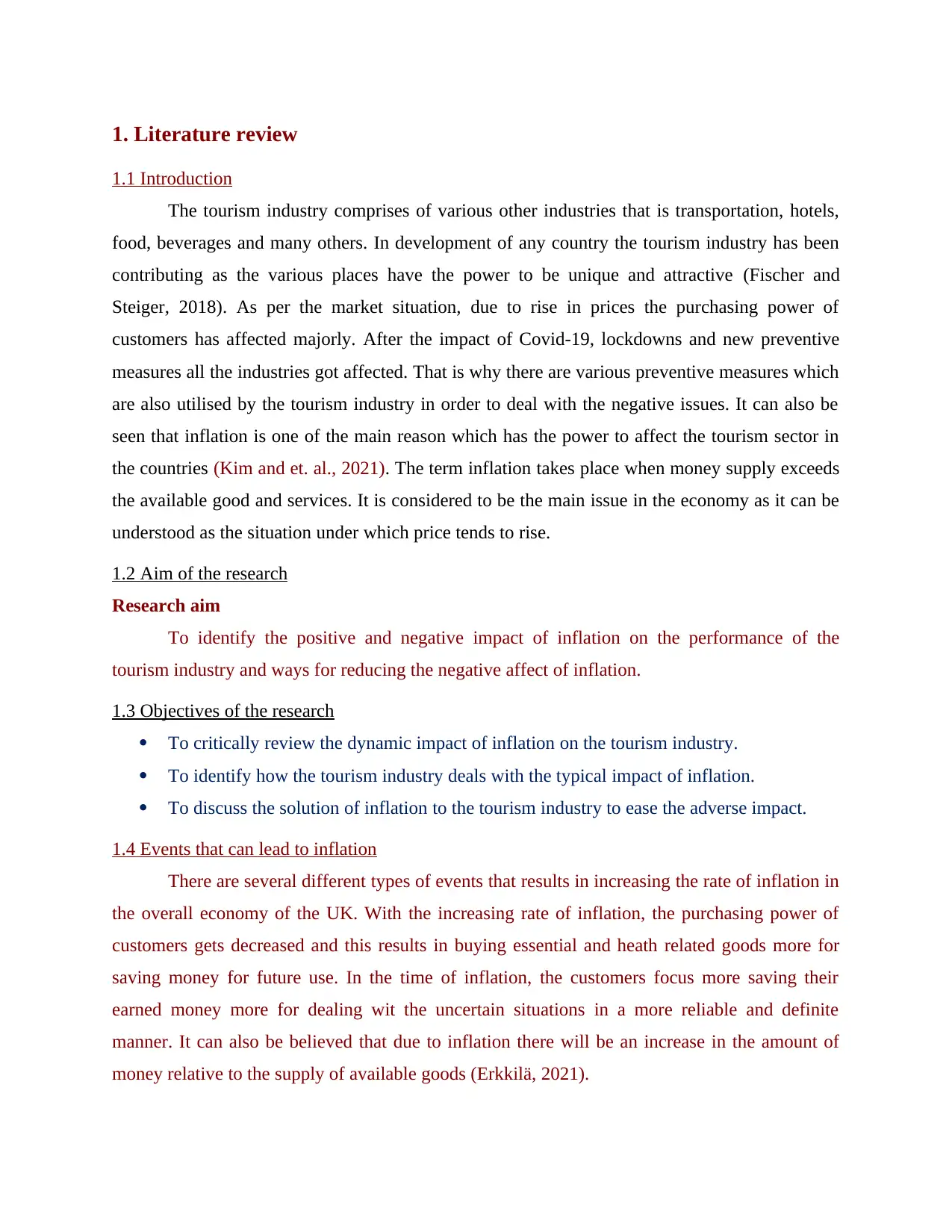
1. Literature review
1.1 Introduction
The tourism industry comprises of various other industries that is transportation, hotels,
food, beverages and many others. In development of any country the tourism industry has been
contributing as the various places have the power to be unique and attractive (Fischer and
Steiger, 2018). As per the market situation, due to rise in prices the purchasing power of
customers has affected majorly. After the impact of Covid-19, lockdowns and new preventive
measures all the industries got affected. That is why there are various preventive measures which
are also utilised by the tourism industry in order to deal with the negative issues. It can also be
seen that inflation is one of the main reason which has the power to affect the tourism sector in
the countries (Kim and et. al., 2021). The term inflation takes place when money supply exceeds
the available good and services. It is considered to be the main issue in the economy as it can be
understood as the situation under which price tends to rise.
1.2 Aim of the research
Research aim
To identify the positive and negative impact of inflation on the performance of the
tourism industry and ways for reducing the negative affect of inflation.
1.3 Objectives of the research
To critically review the dynamic impact of inflation on the tourism industry.
To identify how the tourism industry deals with the typical impact of inflation.
To discuss the solution of inflation to the tourism industry to ease the adverse impact.
1.4 Events that can lead to inflation
There are several different types of events that results in increasing the rate of inflation in
the overall economy of the UK. With the increasing rate of inflation, the purchasing power of
customers gets decreased and this results in buying essential and heath related goods more for
saving money for future use. In the time of inflation, the customers focus more saving their
earned money more for dealing wit the uncertain situations in a more reliable and definite
manner. It can also be believed that due to inflation there will be an increase in the amount of
money relative to the supply of available goods (Erkkilä, 2021).
1.1 Introduction
The tourism industry comprises of various other industries that is transportation, hotels,
food, beverages and many others. In development of any country the tourism industry has been
contributing as the various places have the power to be unique and attractive (Fischer and
Steiger, 2018). As per the market situation, due to rise in prices the purchasing power of
customers has affected majorly. After the impact of Covid-19, lockdowns and new preventive
measures all the industries got affected. That is why there are various preventive measures which
are also utilised by the tourism industry in order to deal with the negative issues. It can also be
seen that inflation is one of the main reason which has the power to affect the tourism sector in
the countries (Kim and et. al., 2021). The term inflation takes place when money supply exceeds
the available good and services. It is considered to be the main issue in the economy as it can be
understood as the situation under which price tends to rise.
1.2 Aim of the research
Research aim
To identify the positive and negative impact of inflation on the performance of the
tourism industry and ways for reducing the negative affect of inflation.
1.3 Objectives of the research
To critically review the dynamic impact of inflation on the tourism industry.
To identify how the tourism industry deals with the typical impact of inflation.
To discuss the solution of inflation to the tourism industry to ease the adverse impact.
1.4 Events that can lead to inflation
There are several different types of events that results in increasing the rate of inflation in
the overall economy of the UK. With the increasing rate of inflation, the purchasing power of
customers gets decreased and this results in buying essential and heath related goods more for
saving money for future use. In the time of inflation, the customers focus more saving their
earned money more for dealing wit the uncertain situations in a more reliable and definite
manner. It can also be believed that due to inflation there will be an increase in the amount of
money relative to the supply of available goods (Erkkilä, 2021).
⊘ This is a preview!⊘
Do you want full access?
Subscribe today to unlock all pages.

Trusted by 1+ million students worldwide
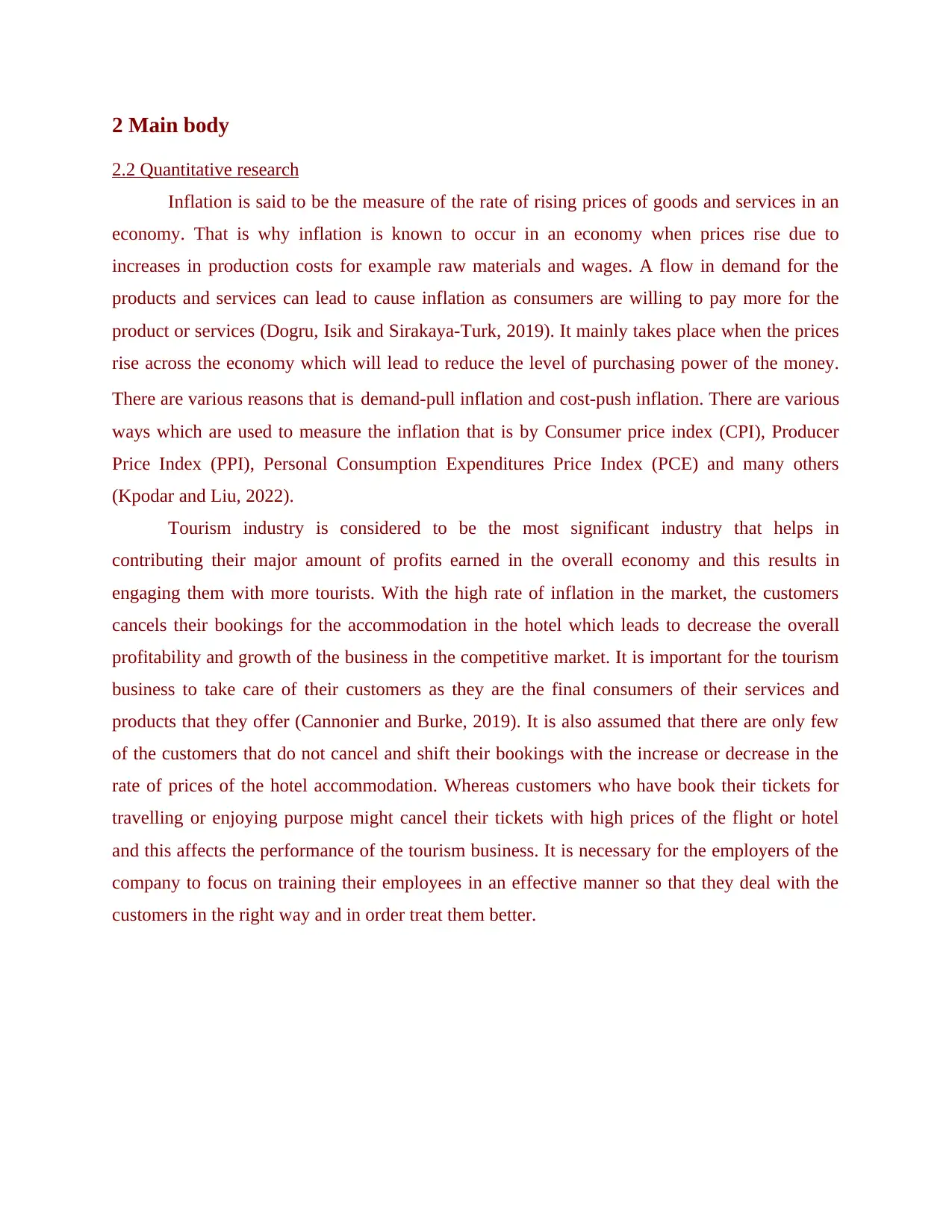
2 Main body
2.2 Quantitative research
Inflation is said to be the measure of the rate of rising prices of goods and services in an
economy. That is why inflation is known to occur in an economy when prices rise due to
increases in production costs for example raw materials and wages. A flow in demand for the
products and services can lead to cause inflation as consumers are willing to pay more for the
product or services (Dogru, Isik and Sirakaya-Turk, 2019). It mainly takes place when the prices
rise across the economy which will lead to reduce the level of purchasing power of the money.
There are various reasons that is demand-pull inflation and cost-push inflation. There are various
ways which are used to measure the inflation that is by Consumer price index (CPI), Producer
Price Index (PPI), Personal Consumption Expenditures Price Index (PCE) and many others
(Kpodar and Liu, 2022).
Tourism industry is considered to be the most significant industry that helps in
contributing their major amount of profits earned in the overall economy and this results in
engaging them with more tourists. With the high rate of inflation in the market, the customers
cancels their bookings for the accommodation in the hotel which leads to decrease the overall
profitability and growth of the business in the competitive market. It is important for the tourism
business to take care of their customers as they are the final consumers of their services and
products that they offer (Cannonier and Burke, 2019). It is also assumed that there are only few
of the customers that do not cancel and shift their bookings with the increase or decrease in the
rate of prices of the hotel accommodation. Whereas customers who have book their tickets for
travelling or enjoying purpose might cancel their tickets with high prices of the flight or hotel
and this affects the performance of the tourism business. It is necessary for the employers of the
company to focus on training their employees in an effective manner so that they deal with the
customers in the right way and in order treat them better.
2.2 Quantitative research
Inflation is said to be the measure of the rate of rising prices of goods and services in an
economy. That is why inflation is known to occur in an economy when prices rise due to
increases in production costs for example raw materials and wages. A flow in demand for the
products and services can lead to cause inflation as consumers are willing to pay more for the
product or services (Dogru, Isik and Sirakaya-Turk, 2019). It mainly takes place when the prices
rise across the economy which will lead to reduce the level of purchasing power of the money.
There are various reasons that is demand-pull inflation and cost-push inflation. There are various
ways which are used to measure the inflation that is by Consumer price index (CPI), Producer
Price Index (PPI), Personal Consumption Expenditures Price Index (PCE) and many others
(Kpodar and Liu, 2022).
Tourism industry is considered to be the most significant industry that helps in
contributing their major amount of profits earned in the overall economy and this results in
engaging them with more tourists. With the high rate of inflation in the market, the customers
cancels their bookings for the accommodation in the hotel which leads to decrease the overall
profitability and growth of the business in the competitive market. It is important for the tourism
business to take care of their customers as they are the final consumers of their services and
products that they offer (Cannonier and Burke, 2019). It is also assumed that there are only few
of the customers that do not cancel and shift their bookings with the increase or decrease in the
rate of prices of the hotel accommodation. Whereas customers who have book their tickets for
travelling or enjoying purpose might cancel their tickets with high prices of the flight or hotel
and this affects the performance of the tourism business. It is necessary for the employers of the
company to focus on training their employees in an effective manner so that they deal with the
customers in the right way and in order treat them better.
Paraphrase This Document
Need a fresh take? Get an instant paraphrase of this document with our AI Paraphraser
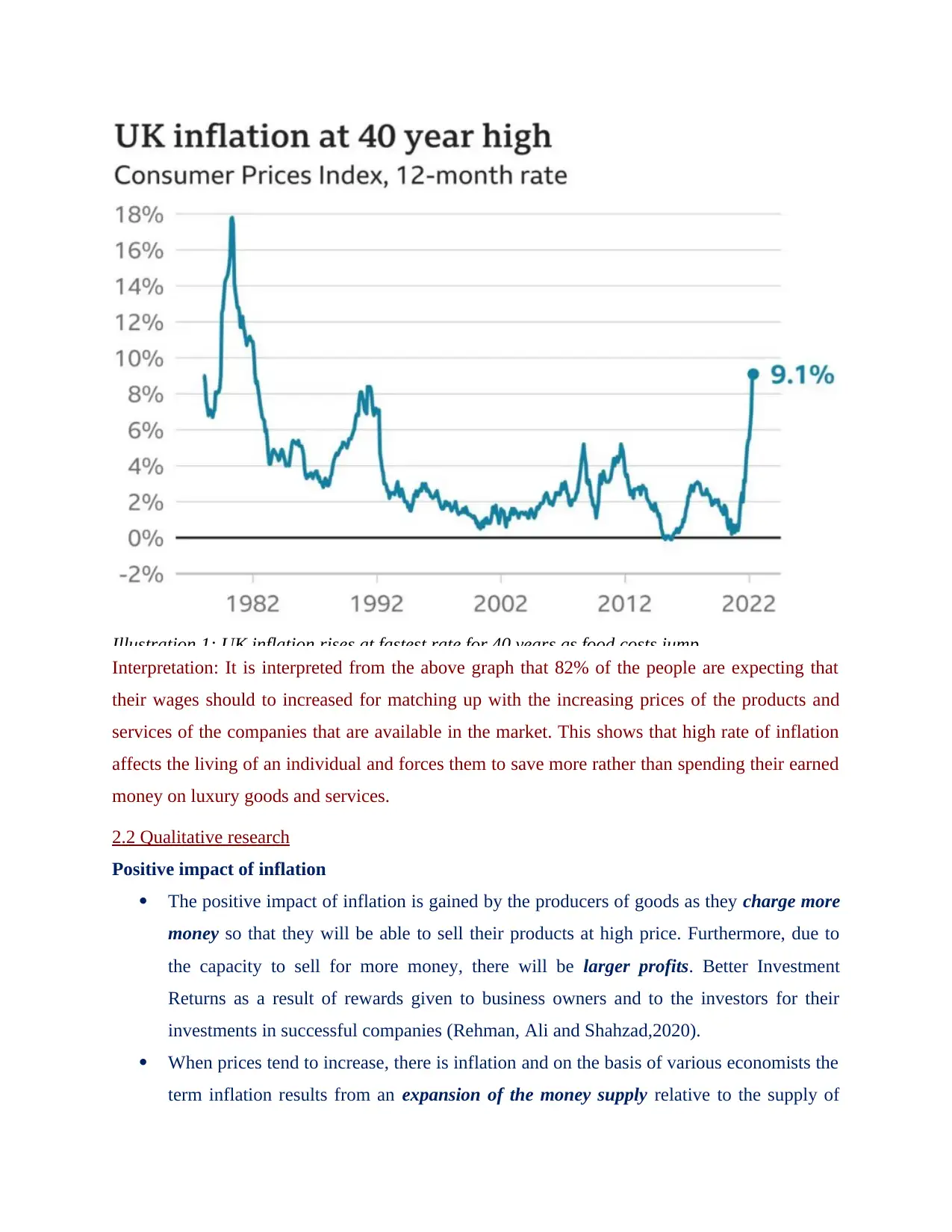
Illustration 1: UK inflation rises at fastest rate for 40 years as food costs jump
Interpretation: It is interpreted from the above graph that 82% of the people are expecting that
their wages should to increased for matching up with the increasing prices of the products and
services of the companies that are available in the market. This shows that high rate of inflation
affects the living of an individual and forces them to save more rather than spending their earned
money on luxury goods and services.
2.2 Qualitative research
Positive impact of inflation
The positive impact of inflation is gained by the producers of goods as they charge more
money so that they will be able to sell their products at high price. Furthermore, due to
the capacity to sell for more money, there will be larger profits. Better Investment
Returns as a result of rewards given to business owners and to the investors for their
investments in successful companies (Rehman, Ali and Shahzad,2020).
When prices tend to increase, there is inflation and on the basis of various economists the
term inflation results from an expansion of the money supply relative to the supply of
Interpretation: It is interpreted from the above graph that 82% of the people are expecting that
their wages should to increased for matching up with the increasing prices of the products and
services of the companies that are available in the market. This shows that high rate of inflation
affects the living of an individual and forces them to save more rather than spending their earned
money on luxury goods and services.
2.2 Qualitative research
Positive impact of inflation
The positive impact of inflation is gained by the producers of goods as they charge more
money so that they will be able to sell their products at high price. Furthermore, due to
the capacity to sell for more money, there will be larger profits. Better Investment
Returns as a result of rewards given to business owners and to the investors for their
investments in successful companies (Rehman, Ali and Shahzad,2020).
When prices tend to increase, there is inflation and on the basis of various economists the
term inflation results from an expansion of the money supply relative to the supply of
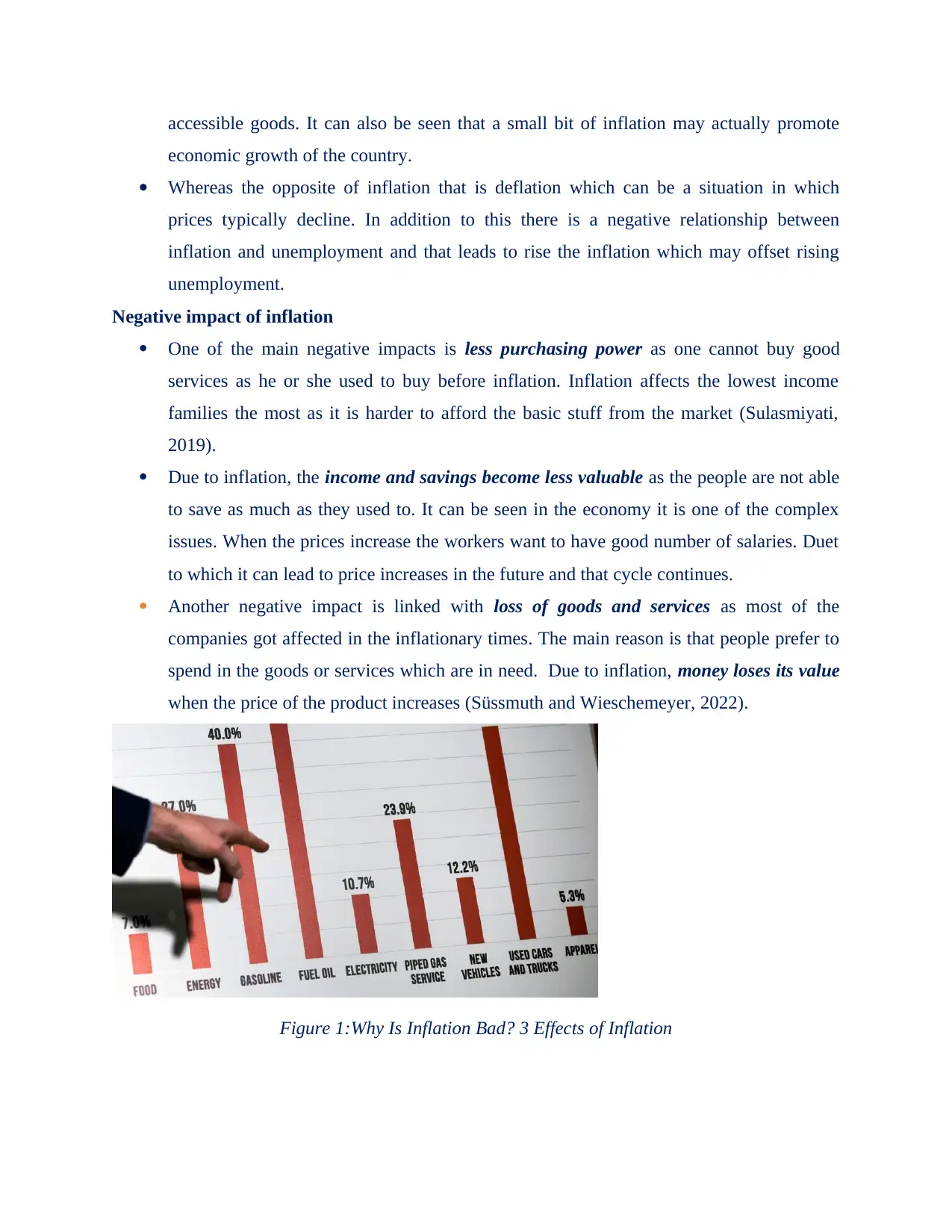
accessible goods. It can also be seen that a small bit of inflation may actually promote
economic growth of the country.
Whereas the opposite of inflation that is deflation which can be a situation in which
prices typically decline. In addition to this there is a negative relationship between
inflation and unemployment and that leads to rise the inflation which may offset rising
unemployment.
Negative impact of inflation
One of the main negative impacts is less purchasing power as one cannot buy good
services as he or she used to buy before inflation. Inflation affects the lowest income
families the most as it is harder to afford the basic stuff from the market (Sulasmiyati,
2019).
Due to inflation, the income and savings become less valuable as the people are not able
to save as much as they used to. It can be seen in the economy it is one of the complex
issues. When the prices increase the workers want to have good number of salaries. Duet
to which it can lead to price increases in the future and that cycle continues.
Another negative impact is linked with loss of goods and services as most of the
companies got affected in the inflationary times. The main reason is that people prefer to
spend in the goods or services which are in need. Due to inflation, money loses its value
when the price of the product increases (Süssmuth and Wieschemeyer, 2022).
Figure 1:Why Is Inflation Bad? 3 Effects of Inflation
economic growth of the country.
Whereas the opposite of inflation that is deflation which can be a situation in which
prices typically decline. In addition to this there is a negative relationship between
inflation and unemployment and that leads to rise the inflation which may offset rising
unemployment.
Negative impact of inflation
One of the main negative impacts is less purchasing power as one cannot buy good
services as he or she used to buy before inflation. Inflation affects the lowest income
families the most as it is harder to afford the basic stuff from the market (Sulasmiyati,
2019).
Due to inflation, the income and savings become less valuable as the people are not able
to save as much as they used to. It can be seen in the economy it is one of the complex
issues. When the prices increase the workers want to have good number of salaries. Duet
to which it can lead to price increases in the future and that cycle continues.
Another negative impact is linked with loss of goods and services as most of the
companies got affected in the inflationary times. The main reason is that people prefer to
spend in the goods or services which are in need. Due to inflation, money loses its value
when the price of the product increases (Süssmuth and Wieschemeyer, 2022).
Figure 1:Why Is Inflation Bad? 3 Effects of Inflation
⊘ This is a preview!⊘
Do you want full access?
Subscribe today to unlock all pages.

Trusted by 1+ million students worldwide
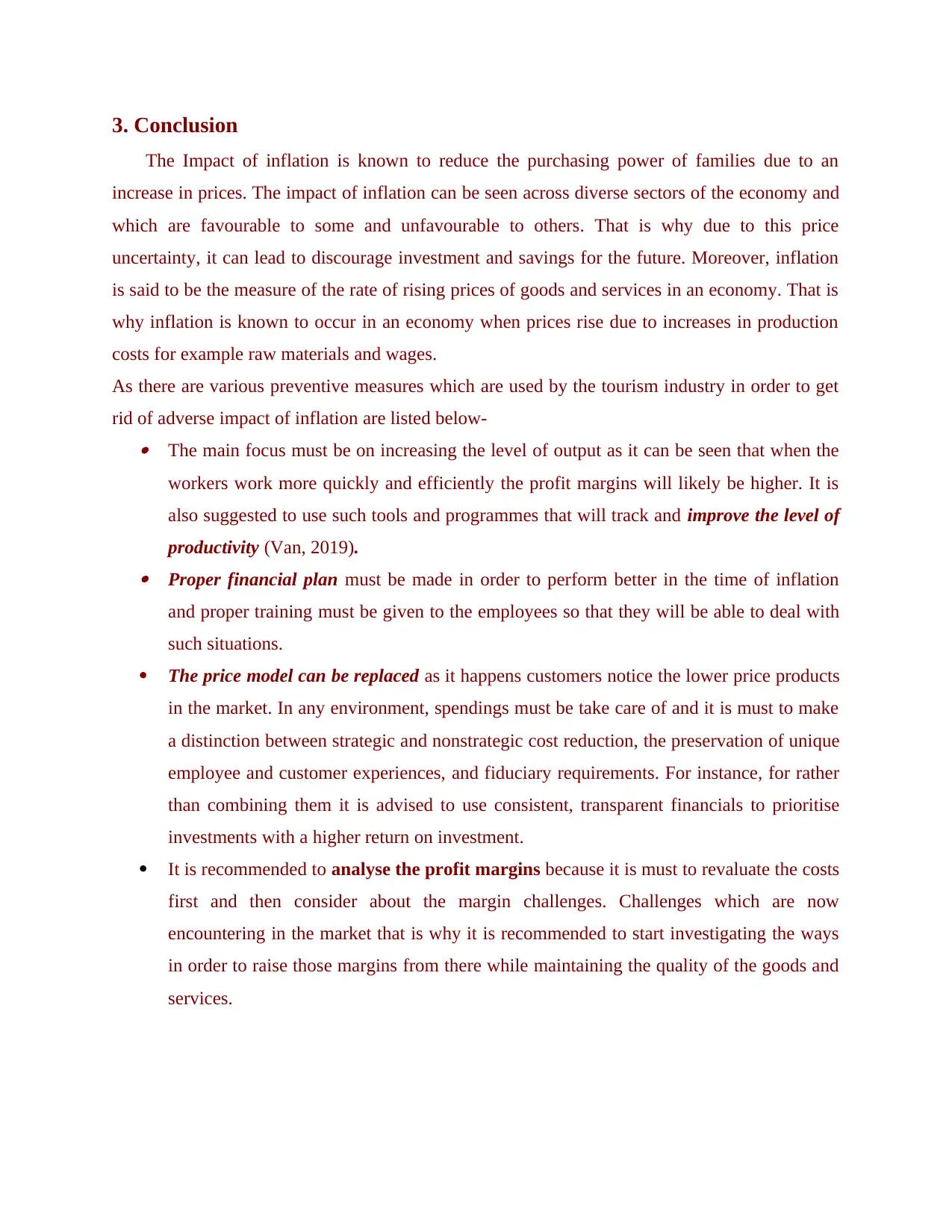
3. Conclusion
The Impact of inflation is known to reduce the purchasing power of families due to an
increase in prices. The impact of inflation can be seen across diverse sectors of the economy and
which are favourable to some and unfavourable to others. That is why due to this price
uncertainty, it can lead to discourage investment and savings for the future. Moreover, inflation
is said to be the measure of the rate of rising prices of goods and services in an economy. That is
why inflation is known to occur in an economy when prices rise due to increases in production
costs for example raw materials and wages.
As there are various preventive measures which are used by the tourism industry in order to get
rid of adverse impact of inflation are listed below- The main focus must be on increasing the level of output as it can be seen that when the
workers work more quickly and efficiently the profit margins will likely be higher. It is
also suggested to use such tools and programmes that will track and improve the level of
productivity (Van, 2019). Proper financial plan must be made in order to perform better in the time of inflation
and proper training must be given to the employees so that they will be able to deal with
such situations.
The price model can be replaced as it happens customers notice the lower price products
in the market. In any environment, spendings must be take care of and it is must to make
a distinction between strategic and nonstrategic cost reduction, the preservation of unique
employee and customer experiences, and fiduciary requirements. For instance, for rather
than combining them it is advised to use consistent, transparent financials to prioritise
investments with a higher return on investment.
It is recommended to analyse the profit margins because it is must to revaluate the costs
first and then consider about the margin challenges. Challenges which are now
encountering in the market that is why it is recommended to start investigating the ways
in order to raise those margins from there while maintaining the quality of the goods and
services.
The Impact of inflation is known to reduce the purchasing power of families due to an
increase in prices. The impact of inflation can be seen across diverse sectors of the economy and
which are favourable to some and unfavourable to others. That is why due to this price
uncertainty, it can lead to discourage investment and savings for the future. Moreover, inflation
is said to be the measure of the rate of rising prices of goods and services in an economy. That is
why inflation is known to occur in an economy when prices rise due to increases in production
costs for example raw materials and wages.
As there are various preventive measures which are used by the tourism industry in order to get
rid of adverse impact of inflation are listed below- The main focus must be on increasing the level of output as it can be seen that when the
workers work more quickly and efficiently the profit margins will likely be higher. It is
also suggested to use such tools and programmes that will track and improve the level of
productivity (Van, 2019). Proper financial plan must be made in order to perform better in the time of inflation
and proper training must be given to the employees so that they will be able to deal with
such situations.
The price model can be replaced as it happens customers notice the lower price products
in the market. In any environment, spendings must be take care of and it is must to make
a distinction between strategic and nonstrategic cost reduction, the preservation of unique
employee and customer experiences, and fiduciary requirements. For instance, for rather
than combining them it is advised to use consistent, transparent financials to prioritise
investments with a higher return on investment.
It is recommended to analyse the profit margins because it is must to revaluate the costs
first and then consider about the margin challenges. Challenges which are now
encountering in the market that is why it is recommended to start investigating the ways
in order to raise those margins from there while maintaining the quality of the goods and
services.
Paraphrase This Document
Need a fresh take? Get an instant paraphrase of this document with our AI Paraphraser
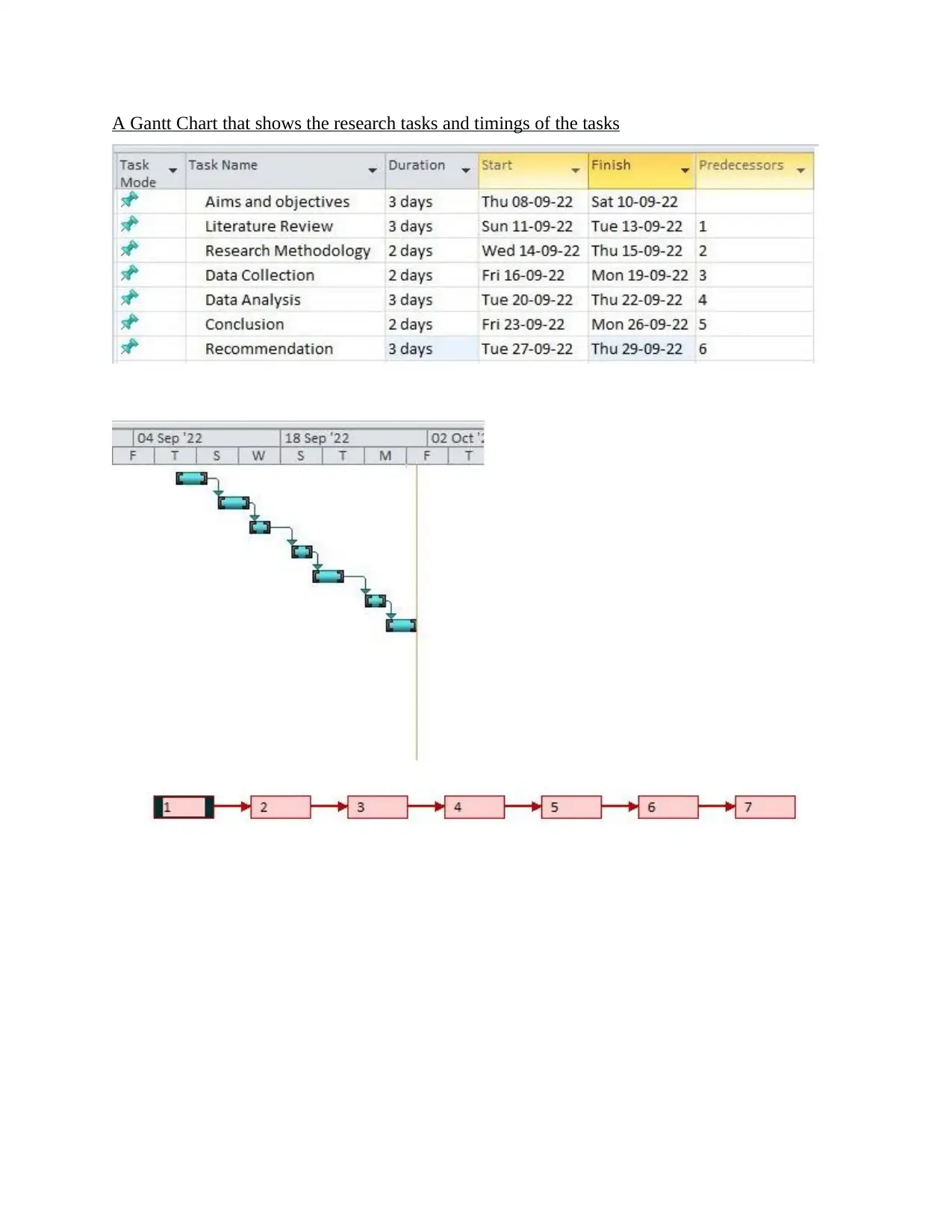
A Gantt Chart that shows the research tasks and timings of the tasks
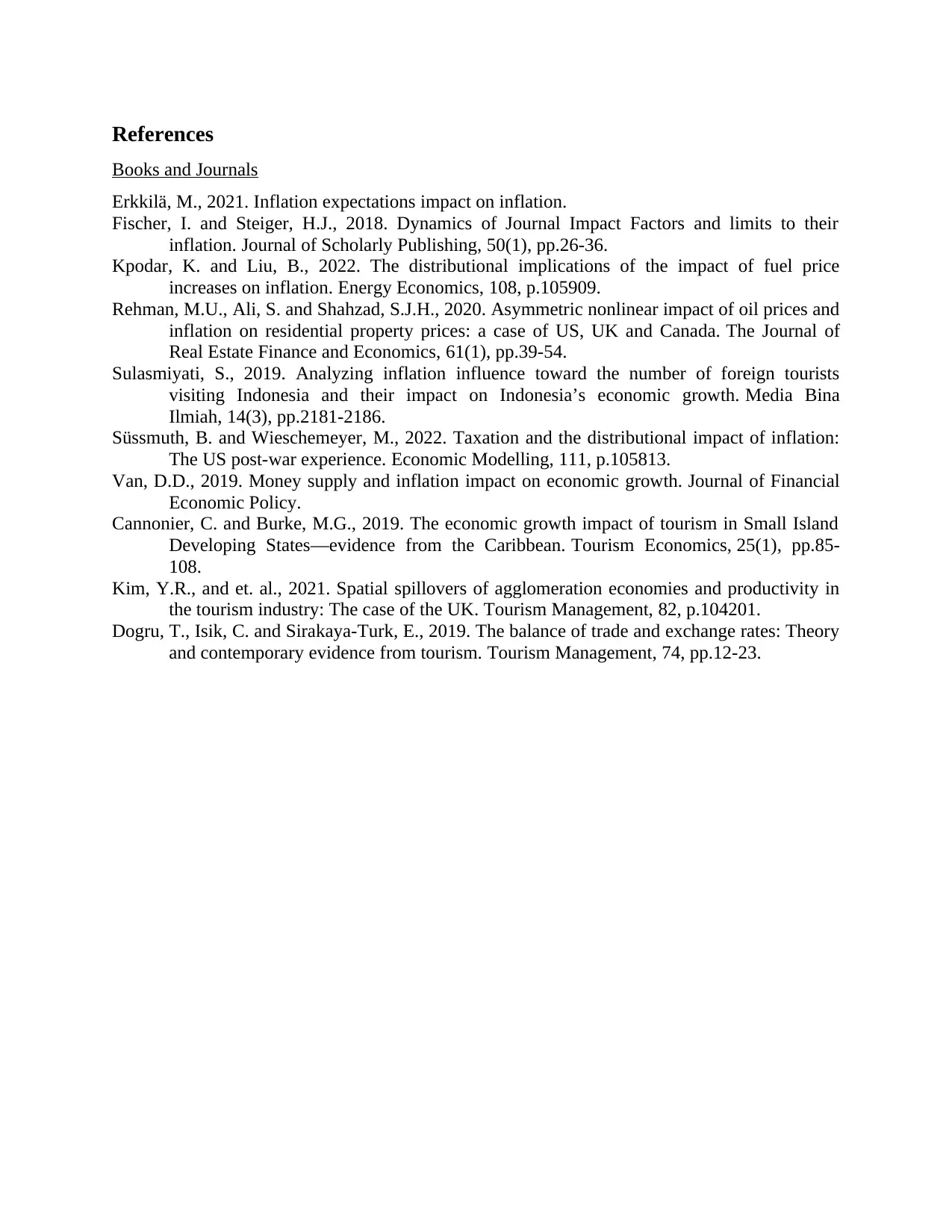
References
Books and Journals
Erkkilä, M., 2021. Inflation expectations impact on inflation.
Fischer, I. and Steiger, H.J., 2018. Dynamics of Journal Impact Factors and limits to their
inflation. Journal of Scholarly Publishing, 50(1), pp.26-36.
Kpodar, K. and Liu, B., 2022. The distributional implications of the impact of fuel price
increases on inflation. Energy Economics, 108, p.105909.
Rehman, M.U., Ali, S. and Shahzad, S.J.H., 2020. Asymmetric nonlinear impact of oil prices and
inflation on residential property prices: a case of US, UK and Canada. The Journal of
Real Estate Finance and Economics, 61(1), pp.39-54.
Sulasmiyati, S., 2019. Analyzing inflation influence toward the number of foreign tourists
visiting Indonesia and their impact on Indonesia’s economic growth. Media Bina
Ilmiah, 14(3), pp.2181-2186.
Süssmuth, B. and Wieschemeyer, M., 2022. Taxation and the distributional impact of inflation:
The US post-war experience. Economic Modelling, 111, p.105813.
Van, D.D., 2019. Money supply and inflation impact on economic growth. Journal of Financial
Economic Policy.
Cannonier, C. and Burke, M.G., 2019. The economic growth impact of tourism in Small Island
Developing States—evidence from the Caribbean. Tourism Economics, 25(1), pp.85-
108.
Kim, Y.R., and et. al., 2021. Spatial spillovers of agglomeration economies and productivity in
the tourism industry: The case of the UK. Tourism Management, 82, p.104201.
Dogru, T., Isik, C. and Sirakaya-Turk, E., 2019. The balance of trade and exchange rates: Theory
and contemporary evidence from tourism. Tourism Management, 74, pp.12-23.
Books and Journals
Erkkilä, M., 2021. Inflation expectations impact on inflation.
Fischer, I. and Steiger, H.J., 2018. Dynamics of Journal Impact Factors and limits to their
inflation. Journal of Scholarly Publishing, 50(1), pp.26-36.
Kpodar, K. and Liu, B., 2022. The distributional implications of the impact of fuel price
increases on inflation. Energy Economics, 108, p.105909.
Rehman, M.U., Ali, S. and Shahzad, S.J.H., 2020. Asymmetric nonlinear impact of oil prices and
inflation on residential property prices: a case of US, UK and Canada. The Journal of
Real Estate Finance and Economics, 61(1), pp.39-54.
Sulasmiyati, S., 2019. Analyzing inflation influence toward the number of foreign tourists
visiting Indonesia and their impact on Indonesia’s economic growth. Media Bina
Ilmiah, 14(3), pp.2181-2186.
Süssmuth, B. and Wieschemeyer, M., 2022. Taxation and the distributional impact of inflation:
The US post-war experience. Economic Modelling, 111, p.105813.
Van, D.D., 2019. Money supply and inflation impact on economic growth. Journal of Financial
Economic Policy.
Cannonier, C. and Burke, M.G., 2019. The economic growth impact of tourism in Small Island
Developing States—evidence from the Caribbean. Tourism Economics, 25(1), pp.85-
108.
Kim, Y.R., and et. al., 2021. Spatial spillovers of agglomeration economies and productivity in
the tourism industry: The case of the UK. Tourism Management, 82, p.104201.
Dogru, T., Isik, C. and Sirakaya-Turk, E., 2019. The balance of trade and exchange rates: Theory
and contemporary evidence from tourism. Tourism Management, 74, pp.12-23.
⊘ This is a preview!⊘
Do you want full access?
Subscribe today to unlock all pages.

Trusted by 1+ million students worldwide

1 out of 10
Related Documents
Your All-in-One AI-Powered Toolkit for Academic Success.
+13062052269
info@desklib.com
Available 24*7 on WhatsApp / Email
![[object Object]](/_next/static/media/star-bottom.7253800d.svg)
Unlock your academic potential
Copyright © 2020–2026 A2Z Services. All Rights Reserved. Developed and managed by ZUCOL.



